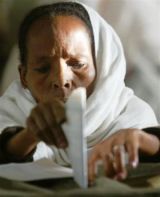May elections violated Ethiopia’s constitution, electoral law – rights body
Oct 29, 2005 (ADDIS ABABA) — A report released by the Ethiopian Human Rights Council Organization (EHRCO) on the last May elections stated that observers had found huge irregularities that violated the constitution and the electoral laws, the Ethiopian Reporter said.
 The election was not free and fair, the report concluded.
The election was not free and fair, the report concluded.
The EHRCO on Thursday 27 October released its final report on the 15 May national and regional elections and the reruns conducted in 31 constituencies where the Complaints Investigation Panels (CIPs) deployed by the National Electoral Board of Ethiopia (NEBE) identified serious irregularities.
The report expressed appreciation of NEBE’s move to allow civil societies and NGOs to observe the electoral process, and welcomed the free air time allotted to parties in the national television and radio to publicize their platforms.
Nonetheless, EHRCO’s observers had found huge irregularities that violated the electoral laws and the constitution. Accordingly, the report said, several cases of serious human rights violations such as harassment, dragging of party members and sympathizers to unknown places by government agents, murder attempts, imprisonment and eviction from jobs were observed in nearly all the regional states, including Addis Ababa.
A close scrutiny of the report shows that the Oromiya Regional State stands as the most notorious as far as violation of human rights were concerned. In that region, EHRCO found out harassment and intimidation of opposition members in over 37 polling stations.
The report disclosed that agents of the ruling party committed the violation in 32 polling stations in Addis Ababa and 52 stations in the Amhara Regional State. According to the report, it was in the Amhara Regional State where the highest cases of “illegal and untidy” vote counting cases took place.
The remote Somali Regional State followed with such cases in 39 polling stations.
The highest number of deliberate electric power interruption cases during vote counting took place in Addis Ababa where, the report said, 11 polling stations had such problems.
Other electoral irregularities identified by the report included deliberate allowing of people with mental disorders to vote, moving of ballot boxes from their original places, multiple voting, underage voting, the deploying of kebele neighbourhood chairpersons as election observers, campaigning on polling day and the use of pre-marked balloting papers, among others.
Nearly all polling stations in the Somali Regional State, the report said, had violated the electoral law by failing to ensure the secrecy of ballot boxes.
As regards the reruns conducted in 31 constituencies on 21 August and the Somali Regional State election, the report pointed out its dissatisfaction with NEBE’s failure to allow civic societies and NGOs to observe the process unlike the case during the 15 May elections.
“The reason for disallowing the civic society organizations and NGOs during the reruns was not clear and it clearly contradicted article 111/87 of the electoral law,” it read. EHRCO attributed the success attained by major opposition parties during the third national and regional elections to the opening of branch offices and party campaigning well before the election, the opening of state media during the pre-election period and the need by the society at large for the abolishment of human rights violations.
